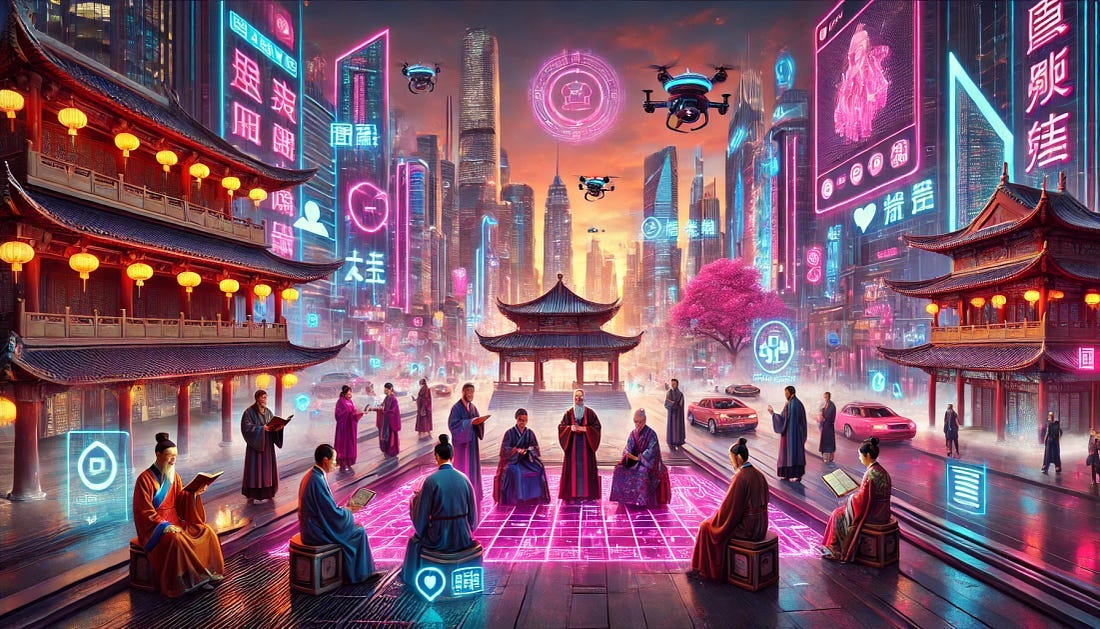Originally published:
EXCLUSIVE INTERVIEW WITH XU JILIN: THE GENERATION BORN IN THE 1990S AND 2000s NO LONGER BELIEVES IN ANY GRAND NARRATIVES (EXCERPTS)
Xu Jilin (许纪霖)
Interviewers: Pan Hongliang (潘洪亮), Wang Huanchao (王焕超) and Zhu Kailin (朱凯麟)
Published by Tencent Research Institute on 22 January 2025
Translated by by Paddy Stephens
(Illustration by OpenAI’s DALL·E 3)
Today’s edition opens with an introduction by David Ownby, founder of the wonderful Reading the China Dream blog and recently retired professor of history at the Université de Montréal.
Few scholars in the English-speaking world have studied and engaged with Xu Jilin’s work as closely as David. He has very kindly agreed to introduce the second part of this particularly insightful and thought-provoking interview with Xu.
Part one, which explores sexuality, boredom and political apathy among China’s youth, can be found here.
Xu Jilin (b. 1957) is a prominent historian and public intellectual, a professor at East China Normal University in Shanghai. The discovery of his writings and his voice changed the course of my professional career, leading to a prolonged engagement with contemporary Chinese intellectual life that I have shared with the world via the Reading the China Dream website.
When I first discovered Xu in the mid-2010s, he had just finished a phase of his career where he sharply criticised intellectual justifications for Chinese exceptionalism (the “China model”, etc.) that circulated widely in China, pointing to similarities with pre-war Germany and Japan. It was impolitic to say “this way lies fascism”, but that was his message in a nutshell.
In the interview translated here (which was taken down shortly after it was posted), Xu reflects on his own life as an intellectual, on the rise and fall of the public sphere, on the many effects of social media on Chinese culture and thought, and on the rise of a vibrant private sphere that offers “warmth” to the Chinese people despite the “chill waves sweeping through steep skies” (Xu here uses a poem by Mao Zedong to obliquely criticise the current regime).
Looking back from 2025, Xu notes that the public sphere that had opened up in China beginning in the 1980s was already starting to close down around 2010, and it is true that his writings from 2015 on are somewhat less fervently engaged in current politics and intellectual debates. Now he says he feels “unemployed”, because with the closure of the public sphere, there are fewer ideas with which to engage. In addition to the political pressures on the public sphere, social media has fractured public opinion and public attention in many of the same ways that it has everywhere. Online influencers have replaced intellectuals as opinion leaders because of their charisma and their turn of phrase, not because they can put together a convincing argument. The logic of China’s thought world is thus driven by the commercial pursuit of volume (number of clicks, amount of traffic) and not by the intellectual pursuit of truth and beauty.
In some ways, we might view this as Xu’s swan song, but Xu will continue to write and think, because that is what he does. This interview is full of his reflections on the complexity of China’s media-driven culture, on the relationship between entrepreneurs and ideas, on young people and how they engage in the world, and on the pleasures of life in the many and varied “molecular communities” that have sprung up as China’s public sphere has dissipated. Xu finds hope here, believing that the vibrancy of Chinese culture and ideas will survive and indeed thrive despite the “chill waves” of the past decade.
David Ownby
The following excerpts have been rearranged for clarity and brevity. Readers are encouraged to read the original article in full.
Key Points
The rise and fragmentation of online media in China has led to an increasingly stratified society, where people from the same generation inhabit different physical, informational and even ideological realities.
Nowhere is this divide more obvious than between China’s urban and rural populations.
Although China has a wealth of “intellectuals", it lacks “true intellectuals”—those who think independently, resist conformity and are willing to express their own judgments publicly.
From around 1980 to 2010, China had a thriving “public sphere” where major social and political issues were debated openly.
This space has since disappeared due to “external factors” and widening divisions among opposing groups of intellectuals.
Studying intellectual trends in China has therefore become increasingly challenging, as most meaningful discussions now take place in small private circles.
Yet, it is precisely the recent flourishing of this private sphere—manifested in group chats, independent bookshops, “academic bars” and so on—that warrants our attention, for it is there that hope for China’s future lies.
• Xu: “This is not something that foreign scholars understand: they see only the ‘Chill waves sweep[ing] through steep skies’ [in China], but do not understand the flip side: the ‘earth's gentle breath grows warm’.”
Although intellectuals still play an important role in contemporary China, their influence in the public sphere has waned, overshadowed by online opinion leaders who prioritise generating traffic over meaningful, reasoned debate.
The Author



